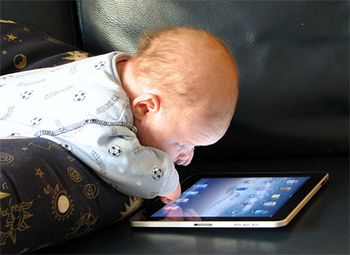
Kids & Tech: Tips for Parents in the Digital Age by Colleen Kraft, M.D., FAAP
 In a world where children are “growing up digital,” it’s important to help them learn healthy concepts of digital use and citizenship. Parents play an important role in teaching these skills.
In a world where children are “growing up digital,” it’s important to help them learn healthy concepts of digital use and citizenship. Parents play an important role in teaching these skills.
Tips to Help Families Manage the Ever-Changing Digital Landscape:
- Make your own family media use plan. Media should work for you and within your family values and parenting style. When used thoughtfully and appropriately, media can enhance daily life. But when used inappropriately or without thought, media can displace many important activities such as face-to-face interaction, family-time, outdoor-play, exercise, unplugged downtime and sleep. Make your plan at HealthyChildren.org/MediaUsePlan.
- Set limits and encourage playtime. Media use, like all other activities, should have reasonable limits. Unstructured and offline play stimulates creativity. Make unplugged playtime a daily priority, especially for very young children. And—don’t forget to join your children in unplugged play whenever possible.
- Families who play together, learn together. Family participation is also great for media activities—it encourages social interactions, bonding, and learning. Play a video game with your kids. It’s a good way to demonstrate good sportsmanship and gaming etiquette. You will have the opportunity to introduce and s
 hare your own life experiences and perspectives—and guidance—as you play the game.
hare your own life experiences and perspectives—and guidance—as you play the game. - Be a good role model. Teach and model kindness and good manners online. Because children are great mimics, limit your own media use. Interacting with your children is the gold standard!
- Know the value of face-to-face communication. Very young children learn best through two-way communication. Engaging in back-and-forth “talk time” is critical for language development.
- Limit digital media for your youngest family members. Avoid digital media for toddlers younger than 18 to 24 months other than video chatting. For children 18 to 24 months, watch digital media with them because they learn from watching and talking with you. Limit screen use for preschool children, ages 2 to 5, to just 1 hour a day of high-quality programing, and watch it with them so you can help them learn from what they’re seeing.

- Create tech-free zones. Keep family mealtimes, other family and social gatherings, and children’s bedrooms screen free. These changes encourage more family time, healthier eating habits, and better sleep, all critical for children’s wellness.
- Apps for kids – do your homework. More than 80,000 apps are labeled as educational, but little research has demonstrated their actual quality. Look to organizations like Common Sense Media for reviews about age-appropriate apps, games and programs to guide you in making the best choices for your children.
- Remember: Kids will be kids. Kids will make mistakes using media. Try to handle errors with empathy and turn a mistake into a teachable moment.
The information provided is for general interest only and should not be misconstrued as a diagnosis, prognosis or treatment recommendation. This information does not in any way constitute the practice of medicine, or any other health care profession. Readers are directed to consult their health care provider regarding their specific health situation. Marque Medical is not liable for any action taken by a reader based upon this information.
